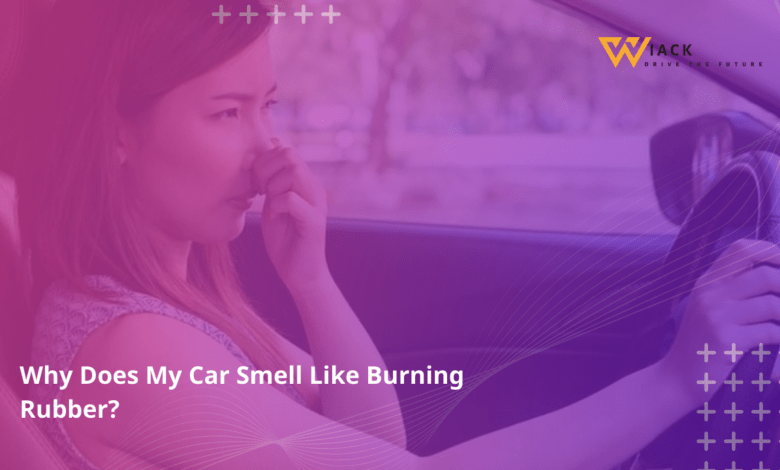Why Does My Car Smell Like Burning Rubber?

Did you know that over 60% of drivers have experienced a burning rubber smell in their car at some point? This startling statistic highlights just how common this issue is among vehicle owners. If you’ve ever caught a whiff of that distinct odor while driving, you’re not alone. But what causes it, and more importantly, how can you fix it?
In this comprehensive guide, we’ll explore the various reasons behind that unpleasant rubber odor in your car, how to diagnose the problem, and what steps you can take to resolve it. Whether you’re a seasoned car enthusiast or a new driver, understanding these issues can help you maintain your vehicle and potentially avoid costly repairs down the road.
Common Causes of Burning Rubber Smell
When your car smells like burning rubber, it’s often a sign that something isn’t quite right under the hood. Let’s dive into the most common culprits behind this concerning odor.
Slipping or Rubbing Car Belts
One of the most frequent causes of a burning rubber smell in car is a problem with the vehicle’s belts. Your car has several belts that play crucial roles in its operation, including the serpentine belt, timing belt, and in some cases, separate belts for the alternator or power steering.
When these belts become loose, misaligned, or worn, they can slip or rub against other components, generating friction and heat. This friction can cause the rubber to burn, resulting in that distinctive odor. In some cases, you might even hear a squealing noise accompanying the smell, especially when you start the engine or accelerate.
Worn or Damaged Tires
While less common, issues with your tires can also lead to a burning rubber odor in vehicle. This typically occurs in more extreme situations, such as when a tire is severely underinflated or if you’ve been driving aggressively with lots of sudden stops or sharp turns.
In these cases, the excessive friction between the tire and the road surface can cause the rubber to heat up significantly, producing a burning smell. If you notice this smell along with any unusual vibrations or handling issues, it’s crucial to check your tires immediately.
Overheating Brakes
Your car’s braking system is another potential source of a burning rubber smell. When you apply the brakes, the brake pads press against the rotors to slow down or stop the vehicle. This process generates heat, which is normally dissipated quickly.
However, if you’ve been driving in hilly terrain, towing a heavy load, or repeatedly braking hard (such as in stop-and-go traffic), your brakes can overheat. This overheating can cause the brake pads to emit a smell similar to burning rubber. In severe cases, it might even lead to brake fade, reducing your ability to stop effectively.
Engine Oil Leak
An oil leak might not seem like an obvious cause of a rubber smell, but it can indeed create this odor. If engine oil leaks onto hot engine components or the exhaust system, it can burn and produce a smell similar to burning rubber.
This situation is particularly concerning because not only does it create an unpleasant odor, but it also means your engine is losing vital lubrication. Left unchecked, an oil leak can lead to serious engine damage.
Coolant Leak
Similar to an oil leak, a coolant leak can also result in a burning rubber smell. Coolant, also known as antifreeze, plays a crucial role in regulating your engine’s temperature. If it leaks onto hot engine parts, it can burn and produce an odor that some people describe as similar to burning rubber.
A coolant leak is a serious issue that needs immediate attention. Without proper cooling, your engine can overheat, potentially causing severe and expensive damage.
Clutch Slipping
For vehicles with manual transmissions, a slipping clutch can be another source of a burning smell. The clutch in your car connects the engine to the transmission, allowing you to change gears. When you press the clutch pedal, it disengages this connection, and when you release it, it re-engages.
If the clutch is worn or if you’re riding the clutch (keeping your foot partially on the pedal while driving), it can slip. This slipping causes friction and heat, which can result in a burning smell. While this smell is often described as more similar to burning paper than rubber, it’s still worth mentioning as it’s a common cause of burning odors in manual transmission vehicles.
Automatic Transmission Overheating
In vehicles with automatic transmissions, overheating of the transmission fluid can produce a burning smell. This can happen if the transmission fluid is old, low, or if the transmission is working harder than usual, such as when towing a heavy load or driving in extremely hot weather.
The smell produced by overheating transmission fluid is often described as sweet and burnt, rather than like rubber, but it’s another potential cause of burning odors that drivers should be aware of.
Electrical Short Circuit
Electrical issues in your car can also lead to burning smells. While these smells are often described as more plastic-like than rubber, they’re worth mentioning because they can be serious.
An electrical short circuit can cause wires to overheat, melting their insulation and producing a burning smell. This is not only unpleasant but potentially dangerous, as it could lead to a fire if not addressed promptly.
Foreign Object in the Engine Compartment
Sometimes, a burning rubber smell can be caused by something as simple as a foreign object that’s found its way into your engine compartment. This could be a plastic bag, a piece of rubber, or any other material that’s become lodged against a hot part of the engine.
As the object heats up and potentially melts or burns, it can produce a strong burning odor. While this might seem unlikely, it’s more common than you might think, especially after driving through areas with a lot of debris.
Worn Catalytic Converter
While a failing catalytic converter typically produces more of a rotten egg smell, in some cases, it can create an odor similar to burning rubber. The catalytic converter is part of your car’s exhaust system and helps reduce harmful emissions.
If it becomes clogged or starts to fail, it can overheat and produce unusual smells. This is often accompanied by a decrease in engine performance and potentially a check engine light on your dashboard.
How to Diagnose the Problem
Now that we’ve covered the common causes of a burning rubber smell in car, let’s discuss how you can diagnose the issue. Remember, while some of these checks can be done at home, others may require the expertise of a professional mechanic.
Inspect the Belts and Tensioner
Start by opening your car’s hood and visually inspecting the belts. Look for signs of wear, such as cracks, fraying, or glazing (a shiny appearance on the belt’s surface). Also, check the tension of the belts. A belt that’s too loose can slip, causing friction and that burning smell.
Don’t forget to check the tensioner as well. This component keeps the belt at the correct tension. If it’s failing, it can cause the belt to become loose or misaligned.
Check the Tires and Wheel Alignment
Examine your tires for any signs of unusual wear. If one tire is significantly more worn than the others, or if you notice uneven wear patterns, this could indicate an alignment issue. Also, check the tire pressure – underinflated tires can overheat more easily.
If you’ve recently been driving aggressively or have had to brake hard frequently, feel the tires (carefully, as they may be hot). If one is noticeably hotter than the others, this could be the source of your burning smell.
Examine the Brake Pads and Rotors
If you suspect your brakes might be the culprit, you’ll need to inspect your brake pads and rotors. This usually requires removing the wheels, so if you’re not comfortable doing this yourself, it’s best to have a mechanic take a look.
Signs of overheated brakes include discoloration of the rotors (they may appear blue-ish) and glazing on the brake pads. You might also notice a burning smell that’s stronger near the wheels.
Check for Fluid Leaks
Look under your car for any signs of fluid leaks. Oil leaks will typically leave dark brown or black stains, while coolant leaks are usually green, pink, or orange (depending on the type of coolant used).
You can also check your fluid levels. If your oil or coolant level is lower than it should be, this could indicate a leak. Remember to only check these levels when the engine is cool to avoid injury.
Inspect the Engine Compartment
Take a careful look around your engine compartment. Look for any foreign objects that might have become lodged near hot components. Also, check for any signs of melted plastic or rubber, which could indicate an electrical issue or a component that’s overheating.
Test the Electrical System
If you suspect an electrical issue, you’ll likely need a professional diagnosis. However, you can do a basic check by looking for any obvious signs of damage to wires or electrical components. Look for melted insulation, frayed wires, or any components that appear burnt or discolored.
How to Fix the Burning Rubber Smell
Once you’ve diagnosed the problem, it’s time to fix it. Here are some solutions to the common causes of burning rubber odor in vehicle:
Replace Worn Belts and Tensioner
If your belts are worn or damaged, they’ll need to be replaced. This is a job that can be done at home if you’re comfortable working on your car, but it’s often best left to professionals, especially for timing belts.
When replacing belts, it’s often a good idea to replace the tensioner as well, especially if it’s showing signs of wear. This can help prevent future issues and ensure your new belt operates correctly.
Replace Damaged Tires
If your tires are the source of the smell, you may need to replace them. Uneven wear due to alignment issues might be resolved by having your wheels aligned, but if the tires are significantly damaged or worn, replacement is the safest option.
Replace Overheated Brake Pads
If your brakes have overheated to the point of producing a burning smell, you’ll likely need to replace the brake pads. In severe cases, the rotors might need to be replaced or resurfaced as well.
Repair Oil Leaks
Oil leaks can be tricky to fix, as they can come from various sources. Common culprits include worn gaskets, loose drain plugs, or damaged oil pans. Depending on the source of the leak, the fix could range from simply tightening a bolt to replacing a gasket or even more extensive engine work.
Repair Coolant Leaks
Like oil leaks, coolant leaks can have various causes. It could be as simple as a loose hose clamp or as complex as a cracked engine block. Common fixes include replacing hoses, gaskets, or the radiator itself.
Replace the Clutch
If a slipping clutch is causing your burning smell, you’ll need to have the clutch replaced. This is a significant job that requires removing the transmission, so it’s best left to professionals.
Service the Automatic Transmission
For automatic transmission issues, a service might resolve the problem. This typically involves replacing the transmission fluid and filter. In more severe cases, internal transmission repairs might be necessary.
Repair Electrical Shorts
Electrical issues should always be addressed by a professional due to the complexity of modern vehicle electrical systems and the potential safety risks involved.
Remove Foreign Objects
If you’ve found a foreign object in your engine compartment, carefully remove it. Be sure the engine is cool before you do this to avoid burns.
Replace the Catalytic Converter
A failing catalytic converter will need to be replaced. This is a job best left to professionals, as it involves working with the exhaust system and may require specialized tools.
Prevention Tips
Preventing car odor after driving is often easier and less expensive than fixing the problem after it occurs. Here are some tips to help you avoid that dreaded burning rubber smell:
Regular Maintenance
Following your vehicle’s recommended maintenance schedule is crucial. This includes regular oil changes, belt inspections and replacements, brake service, and transmission service. Regular maintenance can catch many issues before they become serious enough to cause burning smells or other problems.
Proper Driving Habits
Avoid aggressive driving, which can put extra stress on your tires, brakes, and engine. If you drive a manual transmission, make sure you’re not riding the clutch, which can cause premature wear and burning smells.
Avoid Overheating
Be mindful of your vehicle’s temperature gauge, especially in hot weather or when towing. If you notice the temperature rising, pull over safely and let the engine cool down.
Check for Warning Lights
Pay attention to your dashboard warning lights. Many issues that can cause burning smells, such as low oil levels or engine problems, will trigger a warning light before you notice a smell.
Inspect the Engine Compartment Regularly
Make it a habit to open your hood and take a look around the engine compartment regularly. This can help you spot potential issues early, such as loose belts or fluid leaks.
In conclusion, while a burning rubber smell in car can be alarming, understanding its potential causes and how to address them can help you maintain your vehicle and avoid costly repairs. Remember, if you’re ever unsure about a problem with your car or uncomfortable performing checks or repairs yourself, it’s always best to consult with a professional mechanic. Your safety on the road is paramount, and addressing unusual smells promptly can help ensure your vehicle remains reliable and safe to drive.
Get the latest car news, reviews, and prices at Wiack.com. Your one-stop destination for all things automotive.





